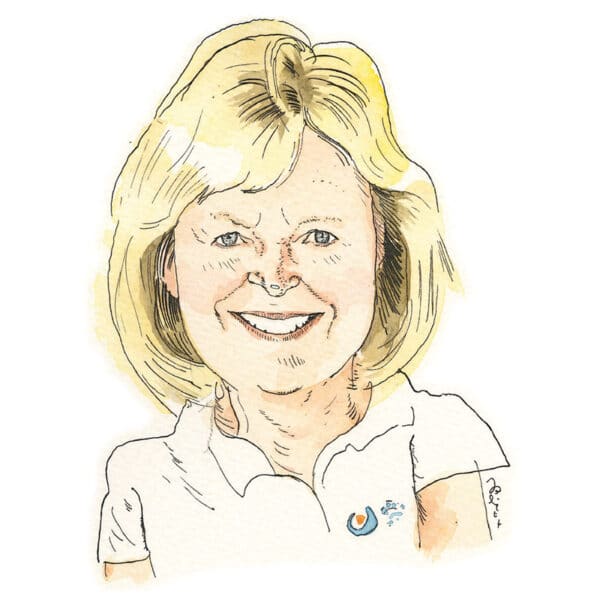GLASA HALF FULL—AND THEN SOME
By Bill McLean
ILLUSTRATION BY BARRY BLITT
Cindy Housner
By Bill McLean
ILLUSTRATION BY BARRY BLITT
Cindy Housner

Cindy Housner was a Milwaukee Public Schools employee when she first worked with adaptive athlete Jean Driscoll in the 1980s.
Driscoll, a high school student at the time, competed as a wheelchair racer.
“I watched her race a few times, and someone came up to me and said, ‘You know, she’s really good,’” Housner recalls. “I then thought, ‘I’d better up my game.’”
Housner’s game soared.
Driscoll’s athletic career later followed suit, joining Housner’s game in the stratosphere. After her eight-year tenure in Milwaukee, Housner served as a member of the 1988 United States Paralympic staff and worked as the executive director of the National Wheelchair Athletic Association in Colorado Springs.
All Driscoll did—under the guidance of her coach at the University of Illinois Urbana-Champaign, Martin Morse—was win the Boston Marathon women’s wheelchair division a record eight times, including seven straight from 1990-1996, and earn a combined 12 medals (five gold) at four Paralympic Games in events ranging from 200 meters to the marathon.
“I was fortunate to have worked with Jean and other adaptive athletes,” says Housner, a Wadsworth resident. “I was also mesmerized, watching all these athletes get opportunities that opened doors for them and led them to set higher expectations.
“Adaptive sports programs,” she adds, “paved the way to youngsters gaining college and job opportunities and becoming more independent from their parents. They’re not just growing as athletes; they’re growing as individuals through athletics.”
Great Lakes Adaptive Sports Association (GLASA) turned 25 this year. Housner has watched it sprout since day one because she created the Lake Forest-based nonprofit in GLASA strives to ensure no one sits on the sidelines. Its mission is to empower and support youth, adults, and injured military who have a physical or visual disability through inclusive adaptive sports programs.
GLASA coaches and supports athletes with disabilities such as amputation, cerebral palsy, dwarfism, muscular dystrophy, spinal cord injury, spina bifida, stroke, visual impairment, and more.
“Interacting with our athletes is one of the most rewarding things I get to do in my position,” Housner says. “And I get to see them push themselves, all while their confidence rises at each practice and competition. But it’s about more than sports; they’re now more productive in everyday life and empowered to reach their highest potential off the field of play.”
GLASA offers 20-plus adaptive and Paralympic sports, from archery to powerlifting to sled hockey, and nearly 600 programming sessions. Some 3,000 youths and adults—ages three to 75-plus—are impacted by outreach programs, with 72 percent of the athletes receiving financial assistance.
“I’m not the key to GLASA’s success,” says Housner, who’s as humble as she is delighted to fuel the lives of every GLASA athlete. “Our coaches are the key. They’re all passionate, with an athletes-first philosophy.
“They’re amazing,” she adds.
One of the coaches is her husband of 34 years, Randy, a marathon trainer. Cindy and Randy road parallel to wheelchair racers at the Bank of America Chicago Marathon on October 13, in case any entrant needed assistance with equipment. GLASA athletes Juan Diego Rodarte, of Island Lake, and Reid Buranosky, of Milwaukee, competed in the 26.2-mile test.
Rodarte vied for a time that would qualify him to race in next year’s Boston Marathon, while Buranosky was a first-time marathon racer. They trained with GLASA coaches along the North Shore Bike Path from Lake Bluff to Mundelein.
Cindy Housner grew up in Milwaukee and attended James Madison High School, now known as James Madison Academic Campus. She got involved in sports after high school, primarily as a softball catcher and a runner “who ran for fun,” she says, adding she and her husband are members of Jenny Spangler Racing, a Lake Forest-based running club.
GLASA’s future founder then majored in Therapeutic Recreation with a concentration in Adaptive Physical Education at the University of Wisconsin-La Crosse, before earning her master’s in Exceptional Education at the University of Wisconsin-Milwaukee.
The Housner couple raised John, who lives in Denver, and Katee, a physical therapist who’s been involved with GLASA for years.
“My husband is retired, so it’s nice to join him for GLASA-related programs and activities,” Housner says. “In August we were on vacation in Door County when GLASA’s wheelchair football team was in a tournament. I felt bad that I couldn’t be there. We won the tournament! I want to be at every practice and at every competition of all our sports, but that’s just not possible.”
Among GLASA’s other adaptive sports offerings are golf, pickleball, goalball, swimming, tennis, track and field, yoga, cycling, judo, kayaking, sailing, water skiing, and wheelchair basketball—Driscoll’s sport at the University of Illinois before she began to thrive as an Illini wheelchair track and field athlete.
Driscoll, now 57, won her eighth and final Boston Marathon in women’s wheelchair in 2000, about 18 years after she met a woman named Cindy and exactly 12 years before she was inducted into the U.S. Olympic Hall of Fame.
“Jean turned out to be an elite adaptive athlete,” Housner says. “But, at GLASA, we’re here to attract the whole range of athletes, from recreational participants who want to have fun to elite athletes who like to go for medals. Those who are thinking about joining GLASA shouldn’t worry that they’re not going to be successful or that they’re not athletic enough. Join GLASA to discover the joys of being active.
“No one,” she continues, “should ever be sidelined.”
For more information about Great Lakes Adaptive Sports Association, visit glasa.org or call 847-494-8483.
Sign Up for the JWC Media Email